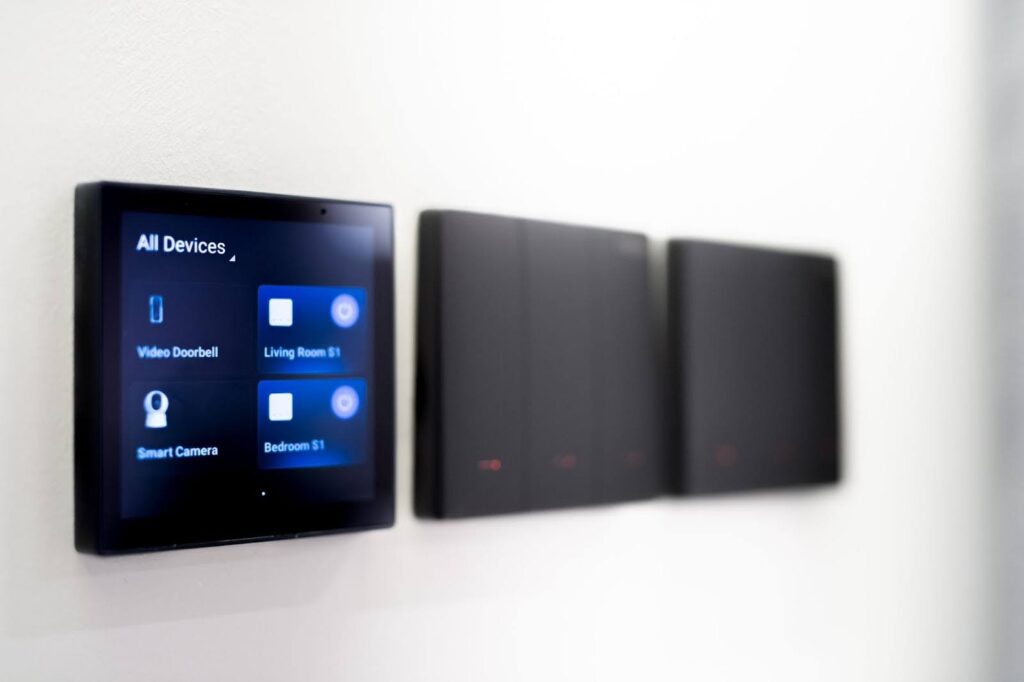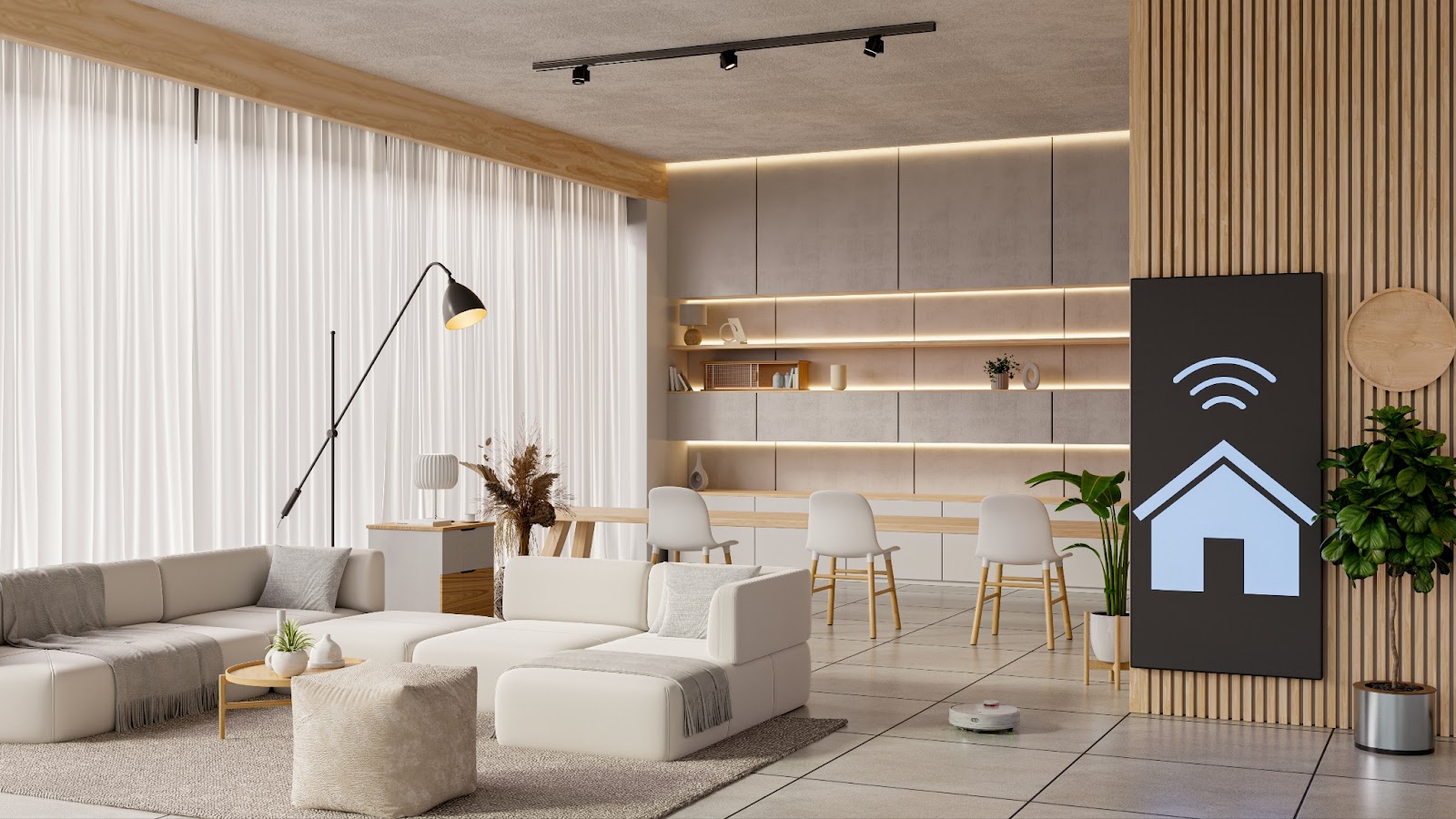Smart home automation systems are becoming a must-have in 2025. They’re not just about gadgets—they’re about making life easier, more efficient, and safer. With a smart home, you can cut down on energy bills, control your environment with ease, and create a space that fits your needs, all at the touch of a button.
Upgrade to a smarter home with AT Smart Home’s devices. Contact us or WhatsApp to get started today!
What Are Smart Home Automation Systems?
Smart home automation systems connect devices, appliances, and systems so they can work together seamlessly. This means you can control different aspects of your home— like lighting, temperature, and security—all from one central point, usually through an app or voice command.
Some of the main features include:
Smart Lighting
Control your lights remotely, set them on a schedule, or change the ambiance with just a tap or voice command.

Security Systems
From cameras to smart locks and motion sensors, these systems allow you to monitor and secure your home from anywhere.
Smart Appliances
Appliances like fridges, ovens, and washing machines that you can manage remotely—making daily chores easier.

Smart Speakers
These devices let you control your smart home with voice commands and also play music, set reminders, and more.
Smart Blinds or Curtains
These can open or close at specific times, helping with energy efficiency or simply adjusting natural light to your liking.

(Source: Envato)
Top Reasons 2025 Is the Year to Invest in Smart Home Automation Systems
Think about how much of your life runs on technology already—your phone, your work, even how you shop. In 2025, smart home automation systems are simply the next step. Here’s how smart home automation systems can help you:
1. Security
With real-time alerts, smart locks, and cameras, you can monitor your home no matter where you are. These systems offer greater peace of mind, knowing that your property is protected.
2. Energy Efficiency
Smart homes help you save on utility bills by monitoring and controlling energy use. For example, smart thermostats can learn your habits and adjust accordingly, reducing unnecessary heating or cooling.

3. Convenience
Manage your home from anywhere with just a tap or voice command. Whether it’s adjusting the heating or turning on the lights, it’s all possible from your phone or smart speaker.
4. Personalisation
Smart homes adapt to your preferences. You can adjust lighting, temperature, and even appliances to create the perfect environment for any occasion.
5. Evolving Needs
As more people work from home or prioritise flexible living, the demand for smart homes is increasing. The convenience and control they offer are becoming essential in modern life.
How Smart Home Automation Systems Enhances Life and Supports Sustainability
When we think of smart homes, it’s easy to focus on gadgets. But the real value lies in how these systems make your home work harder for you—saving you time, money, and energy while improving your living space. Here’s how they truly make a difference:
1. Health and Wellness
Devices like sleep trackers, air purifiers, and mood lighting create a healthier and more comfortable home. You can monitor air quality, optimise sleep, or set lighting that suits your mood and routine.
2. Entertainment
Your entertainment becomes effortless with features like immersive home theatres, voice-controlled music, and personalised streaming options that adapt to your tastes.
3. Safety and Security
Beyond protection from intruders, smart homes include fire and carbon monoxide detectors, water leak sensors, and real-time emergency alerts—ensuring peace of mind.

4. Time-Saving
Smart devices handle daily tasks like setting your home’s lights to turn on at a specific time or preheating the oven remotely—saving you valuable time.
5. Sustainable Living
Smart home systems support eco-conscious living. Solar panels integrated with smart grids, automated water systems, and energy monitors help reduce waste and promote sustainability.
6. Remote Access and Control
Even when you’re away, you can control your home. Adjusting the thermostat, locking doors, or checking security cameras is just a tap away, no matter where you are.

(Source: Envato)
The Future of Smart Homes: Trends to Watch Beyond 2025
Smart home automation systems are constantly evolving, pushing the boundaries of what we once thought possible. Homes could be fully autonomous, while entire cities harness data and connectivity to optimise everything from traffic flow to energy use.
The future won’t just be smarter—it will be transformative, reshaping how we live and interact with the world around us. Here are some trends to watch out for in the smart home industry:
1. AI and Predictive Automation
Thanks to AI, homes will learn your routines and anticipate your actions. Predictive automation will soon ensure that your home adjusts the temperature exactly when you need it or dims the lights the moment you press play on a movie.
2. Sustainability and Energy Innovation
The push for greener living isn’t slowing down. In the future, smart homes could be powered entirely by renewable energy sources.
Solar panels, energy storage systems, and smart grids will work together to reduce energy costs and make your home more eco-friendly.
3. Community Smart Living
Smart home technology won’t just stop at your front door. The early stages of “smart neighbourhoods” are already emerging, with entire communities being integrated into smart systems. Smart cities will be the next step in making everyday life more streamlined.
4. Enhanced Human-Machine Collaboration
In the future, homes won’t just respond to your commands—they will anticipate your needs, adjust to your preferences, and provide a level of convenience and automation never seen before. This fusion will redefine the concept of a “home” entirely.
Conclusion
As smart home technology continues to evolve, its practical benefits become clearer. Investing in smart home automation systems in 2025 is a step towards a more efficient, secure, and tailored living space. It’s no longer about just having the latest gadgets—it’s about creating a home that works for you.
Upgrade to a smarter home with AT Smart Home’s devices. Contact us or WhatsApp to get started today!





